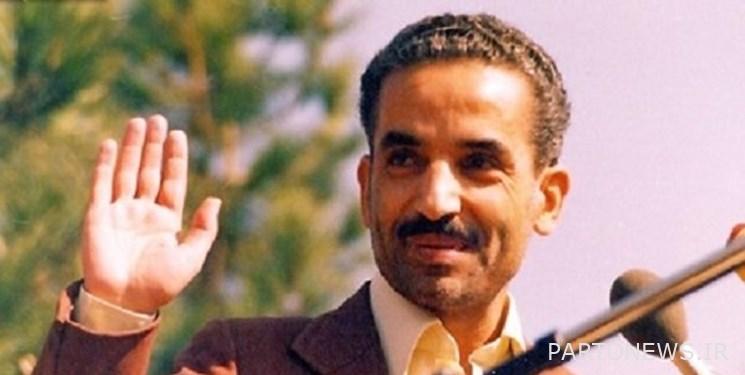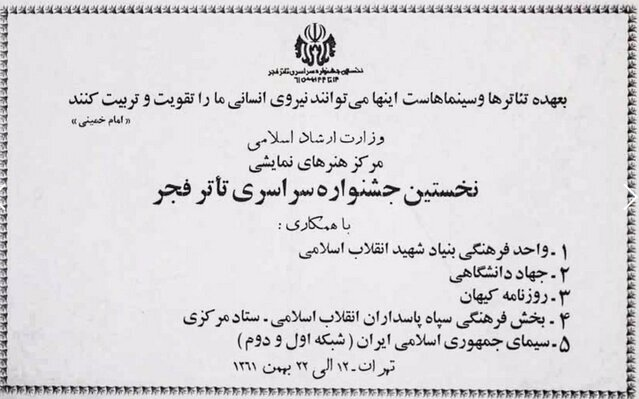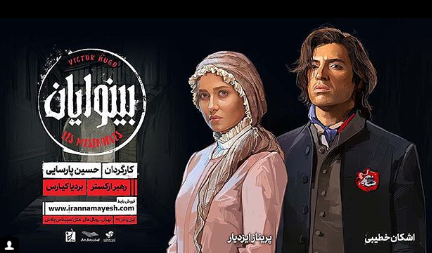Reading Shahid Rajaei’s message for the World Theater Day/Being popular is an important requirement of performing arts

Fars News Agency – Theater Group: Performance art usually has a civilization-building function, and in different dimensions and forms, from cinema to theater, it is a way to create culture and is a gateway for different beliefs to enter the society.
The art of theater has had the same function during different governments throughout history and in the world, and for example, during the Pahlavi era, it had become a gate for the entry of Western culture and civilization into the country. In the years of the revolution, the theater was able to represent a detailed explanation of the discourse of the Islamic Revolution.
* Doran Pahlavi Theater is a gate to the west
From the establishment of European-style theater centers to the 11th Shiraz Art Festival as a symbol of modernism in the country, they all joined hands to attack the roots of Iran’s rich culture and art with a panel of modern and avant-garde art and culture.
With the victory of the Islamic Revolution, the cultural and artistic relations of the country underwent many changes, one of these relations was the discussion of the country’s performing arts, especially the category of theater art.
Of course, its change in the vast dimension of 1957 required time and strong and efficient scientific and theoretical supports.
* The transformation of the theater after the victory of the Islamic Revolution with a look at the message of Shahid Rajaei
From the point of view of many people, after the revolution, the theater was known as a completely western art, an art that perhaps the first approach in facing it was confrontation and opposition. It might appear that it was issued for a global audience, but it was originally written and published for artists and intellectuals in order to provide a manifesto, birth certificate and road map of theater in the post-revolution era.

But unfortunately, in the four decades after that, despite the media capacities of the revolutionary movement, this important message was neither raised nor implemented at all by the relevant managers.
In a part of Shahid Rajaei’s message for World Theater Day, it is stated:
It is obligatory for artists to establish and strengthen their relationship with the deprived masses and to participate in their relentless struggle against oppression, force and corruption, the slum dwellers and the oppressed of the world are waiting for the writers of plays and the actors of the theater stage to be the narrators of their ideals and the scandalous documents. and display the eloquence of the arrogant and the oppressors, the stage should be the stage of fighting against ugliness and filth, oppression and aggression and the place of creating the spirit of hope and struggle in the masses of the people, the stage should be the place of cultivation and education, piety and virtue and in the course of excellence Man should accompany and synchronize with the believing and believing people towards God, the real artist is the one who knows the wishes and hopes of the people of his community and in his writings and performances, the people of the community consider God as the watcher of their actions before that, accepting influence from the sources In the past, the theater stage in our society was reserved only for a certain group, and now it is up to the theater artists to take the show to the deprived masses of the society and to the village.
In this message, Shahid Rajaei expresses that if the theater is to move away from the abyss of westernism and aristocracy and return to its humane and true path, it must take steps in the path of people-oriented and being for the people, being popular for the theater must happen in every sense, the theater must It should express the ideal of the people and go to the stage for the people.
A policy that, perhaps, in the following decades, only one of its slogans remained in festivals and did not actually come to the fore.
* A slogan that did not come true
For example, in the 26th edition of Fajr Theater Festival, while the slogan of theater for everyone was raised as the main slogan of the festival, the director general of performing arts of his country staged the so-called luxury theater in the most luxurious hotel of the country in the following years and after the change of government and policies.

Theater for the people and based on the thinking of the Islamic Revolution was the main and essential message of Shahid Rajaei in that message; The theater, which is different from the Pahlavi era, which was only for a certain class of intellectuals and only propagated non-Islamic thoughts, should have been staged after the victory of the revolution in the service and for the masses of the people, a policy that, unfortunately, in the past years, especially in the government Before, it moved on the same path before the revolution, and the result was that today the theater is only for people who can afford to buy tickets for several hundred thousand tomans.
It is time to reform the structure
Last year and the 40th edition of Fajr Theater Festival was perhaps an attempt to realize this goal, an attempt that took only a few short steps in this direction and did not even come close to its destination.
Forty years is the time of maturity, and now that we have passed the 40th anniversary of the theater festival, let alone the theater after the revolution, it is not only time to reform the structure of this performance, but it is also long overdue.
Today, the General Department of Performing Arts should reform the relations between itself and the artists and play a role in the structure of the theater to transform this art into revolutionary and popular teachings.
Dramas are still staged at exorbitant prices, and seeing the theater is only possible for certain classes. Perhaps the most difficult goal is to control this factor, which requires management and financial resources. But the next point is the management and thematic supervision of the concepts on the stage, an event that seems to be outside the daily duties of the general administration of the show and will be expected.
end of message/
You can edit this article
Suggest this article for the first page

